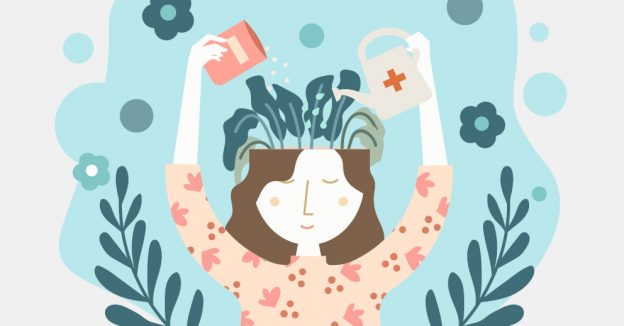Mental health problems are incredibly common. It is estimated that 1 in 6 people in the past week have experienced a common mental health problem. Just as people are not defined by their physical injuries and disabilities, mental illness is not a character flaw and is not a sign of personal weakness. Defining people by their condition contributes to the stigma attached to mental illness, and prevents people that need help from speaking out.
We can confront that stigma by treating people with mental health problems with dignity and by raising awareness of how we can improve our mental wellbeing in our day to day lives. Mental wellbeing is about being able to cope with everyday troubles and having a positive outlook on life. You could work towards this by:
Accessing mental health services
If you’re struggling with your mental health, there is professional help available. Mental health services are free on the NHS, but in some cases you’ll need a referral from your GP to access them. There are some mental health services that allow people to refer themselves, for example the NHS psychological therapies services (IAPT). If your mental health difficulties are related to stress at work, you can ask your employer what occupational health services are available to you.
Learning new skills
Why not learn a new language or work on your public speaking? Personal achievement can help us to realise our potential and give us a sense of purpose, which boosts self-confidence and mental wellbeing.
Being active
Exercise can be easily shaped into a social activity with friends or family, and the benefits of regular exercise to our mental health have been long documented, improving memory and concentration. Regular physical activity is also found to be a strong complement to therapy as a means to reduce stress levels and the symptoms of depression and anxiety disorders.
Being mindful
It’s easy to get caught up in the stresses and strains of modern life, but research shows that taking just a few minutes out to acknowledge our surroundings in the present moment helps us to better manage our thoughts and emotions. There are a number of free resources available that can help you to make a habit out of meditation.
Surrounding yourself with friends and family
As little as a friend to speak to when we are feeling low can be enough to lift our mood and help us feel more connected to society, reducing stress and anxiety levels. Why not reach out to an old friend that you’ve been meaning to catch up with for ages?
Spending time away from people who influence your mental health negatively
Working to reduce the influence that negative people have over your decisions – those that leave you feeling drained by their negativity, criticism or selfishness – means that you are better able to focus on your own needs, ambitions and happiness. Instead, spend more time building relationships with the people that respect and support you.
For more information about World Mental Health Day, please visit the Mental Health Foundation website. Sources of help and guidance can be found at www.mind.org.uk
Mental Health Support at The College of Animal Welfare
As a College, the wellbeing of our students is at the forefront of everything we do. So, we want to make sure that in this time of uncertainty, you still feel supported and know that we are available to offer you any guidance we can.
Togetherall
All staff and students can now access free online mental health and wellbeing support through Togetherall (previously called Big White Wall). This service can be used at any time of the day or night, all year round.
Whether you’re suffering from stress, problems with sleep, feeling low or unable to cope, or simply need someone to talk to, Togetherall can help you get support and learn useful coping strategies to improve mental health and wellbeing. The service enables members to get things off their chest in a safe, anonymous global community. You can access a library of self-care resources and trained professionals are online 24/7 to keep all members safe and provide extra support.
The college will not be informed of those who are signed up to Togetherall or activity on the service unless they are seriously concerned about safety whilst on campus. To join, go to the Togetherall website and sign up under ‘I’m from a university or college’ using a staff or student e-mail address.
College counselling services
In addition to this, we offer a confidential counselling services, with free sessions for students on an ongoing basis (the college is not made aware of any appointments made). The College counsellors are still available via phone, email or video conference:
Jill Dighton
- Tel: 07925 852 985
- Email: jill@jdighton.co.uk
Mark Walsh
- Tel: 07905 611 591
- Email: mwalsh4@sky.com
Mental health resources
- Mental Health Foundation – Looking after your mental health during the Coronavirus outbreak
- Mind – Coronavirus and your wellbeing
- Mental Health England – Supporting your mental health while working from home
- Samaritans – If you’re worried about your mental health during the coronavirus outbreak
- Vetlife– Mental health support and financial assistance for the veterinary community including veterinary nurses and students
- Living Well area on CAW VLE

